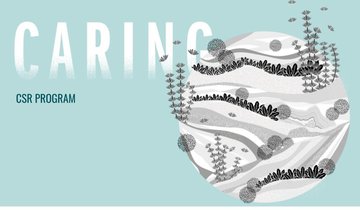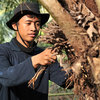Compliance with biodiversity regulations
Respectful access to genetic resources
Seppic prefers using natural sources for the raw materials used in the manufacturing of its ingredients. Our customers have high expectations in terms of naturality, renewability, and sustainability, particularly for cosmetic and nutraceutical applications. Innovation in the ingredients field requires exploring new plant resources around the world. Ensuring that this exploration is mindful of biodiversity and local communities is at the heart of Seppic's sourcing strategy.
Respecting Biodiversity and the Nagoya Protocol
Seppic respects biodiversity regulations that apply in countries where genetic resources and their derivatives are obtained, such as the French Law n°2016-1087 (in French) for the recovery of the biodiversity in France. For instance, BiotechMarine's first Internationally Recognized Certificate of Compliance (IRCC) was issued by the French authorities on October 31, 2018, to certify the compliance of our access to brown algae from Brittany for our non-commercial research activities (IRCC: ABSCH-IRCC-FR-245895).
More generally, we are committed to supporting an ethical approach in our biodiversity-related projects and respecting the principles of the Convention on Biodiversity (CBD), as well as the Nagoya Protocol on accessing genetic resources and sharing the benefits arising from their use. In Madagascar, where we collect plants for the manufacturing of wesource™ cosmetic active ingredients, we have proactively worked with local communities to implement good practices in terms of Access and Benefit Sharing (ABS), even before the Malagasy decree n°2017-066 came into effect in 2017.
In order to ensure sustainable use of resources, we constantly monitor the evolution of the relevant regulatory tools and the status of plant and marine life we use with regard to the CITES and IUCN lists of threatened and endangered species. The CITES convention defines the regulatory framework for global trade in species and specimens listed. The IUCN Red List is the world's leading database on the global conservation status of plant and animal species.
We have set up an internal validation process with a steering committee to ensure that the raw materials and samples of natural origin used by our Innovation laboratories are accessed and utilized in compliance with the Nagoya Protocol and relevant national laws. This process is based on a decision tree and a mapping of different countries with regard to their specificities and evolution of their respective rules for accessing resources, derivatives of genetic resources, traditional knowledge, and benefit-sharing arising from their use.
The ethical approach is essential to our Corporate Social Responsibility program. It is included in our stipulations to our suppliers, as well as in our Innovation laboratories, which use natural resources to eco-design new ingredients.
Contributing to the establishment of compliance processes
Due to the complexity of this domain, Seppic is also involved in efforts by French and European professional associations for cosmetics and nutraceuticals to establish compliance processes and best practice guides related to implementing the Nagoya Protocol.
Seppic thus participates in developing industry guidelines and fact sheets describing countries and their national laws and in contributing to expert committees on Access and Benefit Sharing (ABS) related to the Nagoya Protocol around the world.




